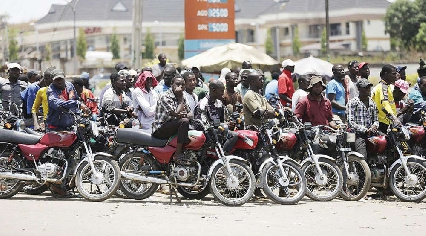
The National Commercial Tricycle and Motorcycle Owners and Riders Association of Nigeria (NATCOMORAN) says the Federal Government's move to ban motorcycles would leave about 80,000 commercial riders jobless in Gombe and Jigawa States.
The Vice Chairman of the association in Gombe State, Suleiman Sani, said the ban will increase unemployment and poverty in Nigeria.
He also said it will result in unimaginable hardship for the state's over 66,000 registered members.
“Proscribing commercial motorcycle operators without giving them alternative means of livelihood will create more problems than what we have now.
“They will engage in other activities that might not be beneficial to the society.”
He said those who repair motorcycles and sell spare parts would also be affected, adding that some riders hire motorcycles to earn money to fend for their families.
“If the government effects the ban, the riders and their families will not have food to eat," he said.
“For now, there is no sector that can accommodate millions of riders and by implication it might worsen the security situation in the country.
“We have nowhere else to turn to if that happens as government cannot employ everyone.”
A similar statement was made by the NATCOMORAN Secretary in Jigawa, Ya'u Muhammad.
He said the proposed motorcycle ban would affect 13,000 members of the association.
He also said thousands of unemployed youth, including graduates, are engaged in the commercial motorcycle trade to fend for themselves and their families.
He argued that the ban on motorcycles without alternative measures in place would disrupt transportation services and increase unemployment and social vices.
“In Jigawa, we have over 13,000 members. What about the states across the country?"
He urged the Federal Government to rescind its decision.
According to him, the country's security challenges require a collective approach, and he expressed their willingness to work with the government to resolve them.
Also, Dalhatu Idris, a motorcycle dealer at Muda Lawal Market in Bauchi, said the issue of insecurity goes beyond motorcycle riding for either personal or commercial purposes.
In his words, the ban would cause more hardship for Nigerians and escalate the security situation in the country.
A commercial motorcyclist in Gombe, Saidu Yakubu said he had been in the business for nearly 15 years, providing for his wife and two children.
“I am having sleepless nights since the government announced the proposed motorcycle ban. I have no alternative job.
“I dropped out of secondary school, I am saving to go back to school to further my education,” he said.
Another rider, Joshua Bitrus said the ban would make him vulnerable to poverty.
“During the lockdown, we had a taste of what idleness could lead to, rape, robbery and other crimes increased because the youths are at home and they need to eat.
“We are appealing to the government to have a change of mind and save us the implications of having idle youths in our communities at a time like this,” he said.
Mubarak Dankani, a resident of Damaturu noted that some of the commercial motorcycle riders were literate and educated.
He said that government lacks the capacity to employ them all, hence the need for the state to encourage and empower them.
This, he said would enable them to engage in meaningful activities and contribute to the social and economic development of the country.
For his part, Buba Gadzama, a resident of Maiduguri said the ban would expose rural dwellers to more hardship and worsen the security situations.
He said security agencies should take the fight to the criminal's hideouts to end the Boko Haram insurgency and banditry in the country.
Mr Caleb Godfrey, a worker in Yola urged the Federal Government not to implement the policy because it would promote crime as many people would be jobless.
“An ideal mind is a devil's workshop,” he said.
Instead of banning motorcycles, he recommended the creation of alternative means of transportation and job opportunities for youth.


